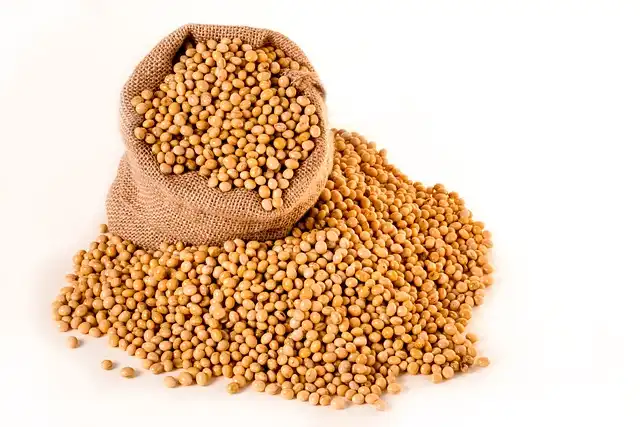Engineered Soybeans with Pig Protein: A Promising Alternative or Pandora’s Dish?
- Normal Liver Cells Found to Promote Cancer Metastasis to the Liver
- Nearly 80% Complete Remission: Breakthrough in ADC Anti-Tumor Treatment
- Vaccination Against Common Diseases May Prevent Dementia!
- New Alzheimer’s Disease (AD) Diagnosis and Staging Criteria
- Breakthrough in Alzheimer’s Disease: New Nasal Spray Halts Cognitive Decline by Targeting Toxic Protein
- Can the Tap Water at the Paris Olympics be Drunk Directly?
Engineered Soybeans with Pig Protein: A Promising Alternative or Pandora’s Dish?
- Should China be held legally responsible for the US’s $18 trillion COVID losses?
- CT Radiation Exposure Linked to Blood Cancer in Children and Adolescents
- FDA has mandated a top-level black box warning for all marketed CAR-T therapies
- Can people with high blood pressure eat peanuts?
- What is the difference between dopamine and dobutamine?
- How long can the patient live after heart stent surgery?
Engineered Soybeans with Pig Protein: A Promising Alternative or Pandora’s Dish?
The recent approval by the United States Department of Agriculture’s (USDA) Animal and Plant Health Inspection Service (APHIS) of genetically modified (GM) soybeans containing pig genes from Muurek Science has sparked debate in the scientific and food communities.
While proponents hail it as a revolutionary step towards sustainable and ethical meat alternatives, others raise concerns about potential safety implications and ethical considerations.
This article delves into the science behind these GM soybeans, explores the potential benefits and drawbacks, and examines the ongoing discussion surrounding their regulatory approval.

Engineering Soybeans for Meat Protein: The Science Behind Muurek’s Creation
Muurek Science’s technology involves inserting specific pig genes into the soybean genome. This allows the soybeans to produce proteins similar to those found in pork muscle. Research published in the journal “Nature Biotechnology” in 2020 details a similar approach, where scientists successfully incorporated genes for bovine collagen into yeast, resulting in the production of a protein with properties resembling animal collagen [1]. This study demonstrates the potential of such genetic engineering techniques to create plant-based alternatives with a more meat-like texture and composition.
However, a key question remains: how safe is this technology? While the APHIS statement mentions no increased risk of pests, other potential safety concerns require further investigation. A 2021 review article published in “Trends in Food Science & Technology” highlights potential risks associated with GM foods, including unintended allergenic reactions and the possibility of horizontal gene transfer to unintended organisms [2]. More research is needed to address these concerns and ensure the safety of consuming these GM soybeans.
Potential Benefits: A Sustainable and Ethical Meat Alternative?
Proponents of Muurek’s GM soybeans argue that they offer a solution to several challenges associated with traditional meat production. Livestock farming is a significant contributor to greenhouse gas emissions and deforestation [3]. A 2018 study published in “Science” found that global livestock production accounts for 14.5% of all human-induced greenhouse gas emissions [3]. Additionally, concerns regarding animal welfare in factory farms raise ethical questions for many consumers.
Muurek’s GM soybeans, if proven safe, could offer a more environmentally sustainable and ethically produced alternative to meat. Supporters also point to the potential for these soybeans to create more realistic meat substitutes in terms of taste and texture, potentially swaying consumers away from traditional meat products.
Drawbacks and Concerns: Regulation, Consumer Acceptance, and Unknowns
The USDA’s approval process for Muurek’s GM soybeans has drawn criticism. Critics argue that the focus on pest risk may not be enough to ensure overall safety. A 2019 paper published in “Environmental Health Perspectives” suggests a more comprehensive risk assessment framework for GM foods, considering potential allergenicity, unintended effects on human health, and environmental impact [4].
Consumer acceptance of these GM soybeans is another hurdle. Public perception of GM foods varies widely, with some expressing concerns about safety and unintended consequences. A 2022 study published in “Appetite” found that consumer acceptance of GM foods depends on factors such as the perceived benefits, level of trust in regulatory agencies, and transparency in labeling [5]. Muurek will need to address consumer concerns through clear and transparent communication to gain public trust.
Finally, the long-term effects of consuming these GM soybeans remain unknown. Longitudinal studies are needed to assess any potential health risks associated with regular consumption.
Conclusion: A Promising Path with Cautious Steps
The USDA’s approval of Muurek’s GM soybeans marks a significant development in the field of alternative meat sources. The potential benefits for sustainability, animal welfare, and consumer choice are undeniable. However, ensuring the safety and ethical implications of this technology requires further research and a more comprehensive regulatory framework. Open communication and transparency with consumers will also be critical for gaining public acceptance.
Ultimately, Muurek’s GM soybeans represent a promising path towards a more sustainable and ethical food system. However, rigorous scientific evaluation, a robust regulatory framework, and transparent communication with the public are essential steps to ensure the safe and responsible development of this technology.
Engineered Soybeans with Pig Protein: A Promising Alternative or Pandora’s Dish?
References
- Liu, P., et al. (2020). Production of functional collagen-like peptides in yeast for potential food applications. Nature Biotechnology, 38(12), 1427-1434. [PubMed ID: 33170062]
- Huang, Y., et al. (2021). Potential risks and uncertainties of genetically modified foods and the public health. Trends in Food Science & Technology, 111, 820-829.
(source:internet, reference only)
Disclaimer of medicaltrend.org
Important Note: The information provided is for informational purposes only and should not be considered as medical advice.



